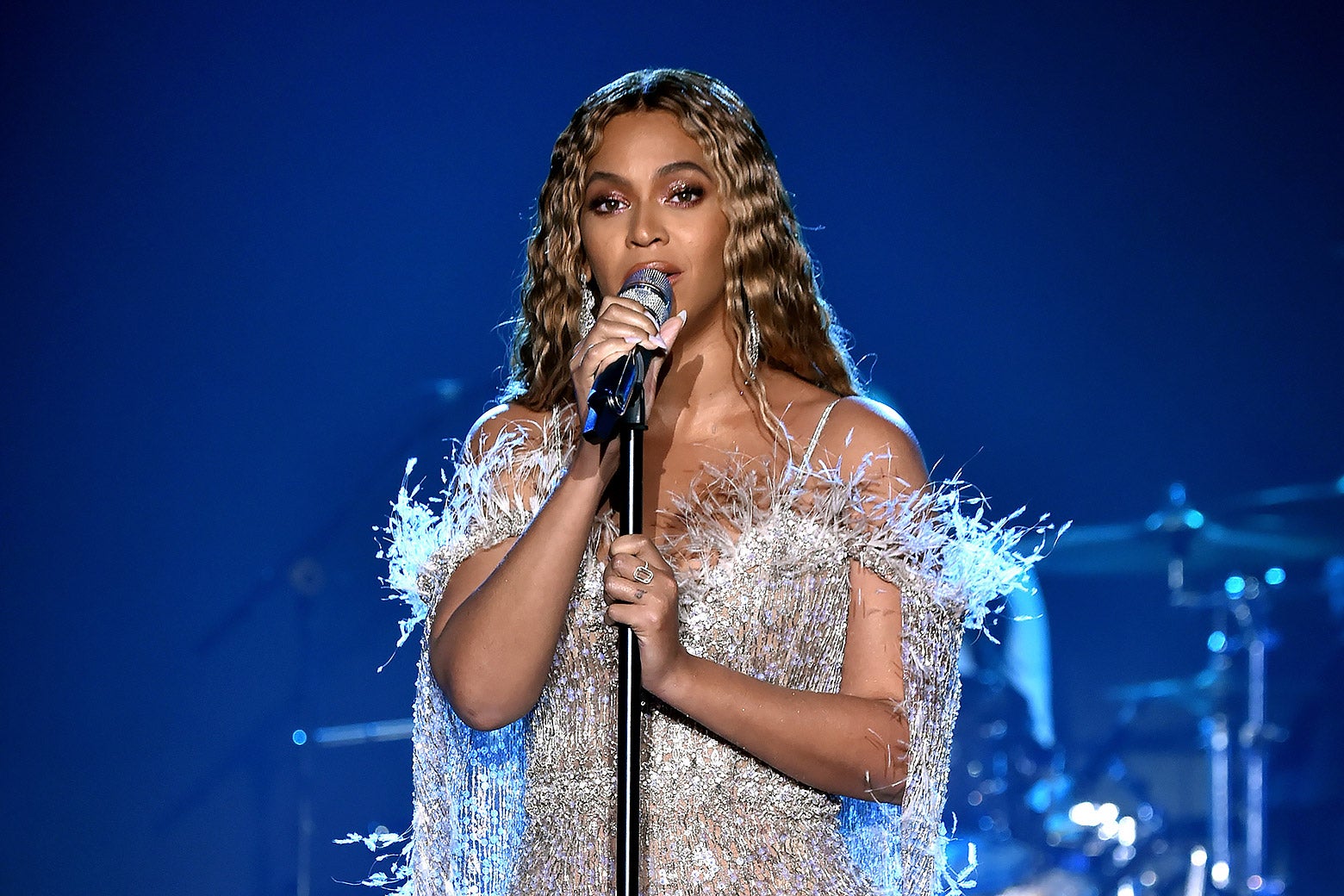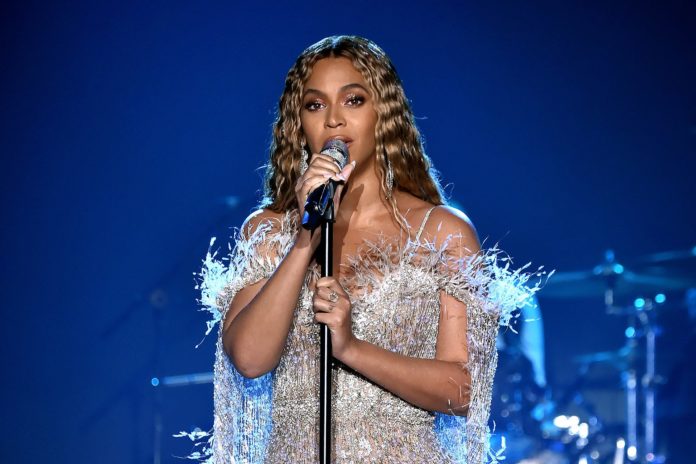
In November 2019, with a little over a month left to go before the start of the ’20s, I dropped an episode of my Hit Parade podcast commemorating the ’10s as the decade was passing into history. I walked through the acts, singles, and movements that dominated the charts: the queens of pop, including Adele, Taylor, Gaga, and Katy, and the kings, including Drake, Justin, Bruno, and the Weeknd. The most memorable Song of Summer battles—Carly Rae vs. Gotye, Daft Punk vs. Robin Thicke, Drake vs. everybody. The fluke hitmakers, from Psy to Macklemore to Iggy Azalea. And at the end of the show—spoiler alert—I declared Rihanna the winner of the ’10s, the synthesizer of pop trends and generator of the most No. 1s, from “We Found Love” to “Work.”
Advertisement
Advertisement
Advertisement
Advertisement
You know what word I never uttered once in that entire 95-minute episode? Beyoncé.
Um … what? you’re asking. How?! Was I inviting the Beygency to throw me in the back of a van and rough me up? How did I do a podcast commemorating the 2010s and skip Beyoncé? Simple: Beyoncé didn’t score a solo or lead-artist No. 1 hit for the duration of that 10-year period. Her only chart-topper in the ’10s was a serviceable, second-billed duet remix with (feh) Ed Sheeran. The woman most music fans assume is our reigning Queen of Pop wasn’t actually scoring … what’s the word? Hits.
I know I sound pretty shady right now about an artist who, over the course of the past 10 years, redefined the entire infrastructure of album marketing and, while she was at it, released three consecutive critically acclaimed classics—Renaissance included. I love all three albums, and I’m actually not throwing shade at Ms. Knowles-Carter. I’m … kind of throwing shade at you.
Advertisement
Advertisement
Yes, you—not just the Beyhive, but also you more passive Beyoncé admirers, who assume everything the queen touches turns to platinum, that anytime she graces us with new music, she not only generates headlines but also guaranteed chart conquerors. This is a fundamental misreading of Beyoncé’s pop profile. I’m not saying this filthy rich, well-rewarded, able to shut down the Louvre for a video artist is an underdog. But hear me, people: It is possible for Beyoncé to fail, or at least underperform. She’s done it before.
I say all this to put some perspective around the new No. 1 song on Billboard’s Hot 100. Not only is it a delight that Beyoncé’s house-meets-bounce dance floor anthem “Break My Soul” rang the bell. It’s also an achievement. This hard-working, artistically inspired near–41-year-old … well, this scrappy kid is a comer.
Advertisement
Advertisement
Advertisement
Let’s spare a few words for the song that returns Queen Bey to No. 1 for the first time as a lead artist since “Single Ladies (Put a Ring on It)” nearly 14 years ago. A deserved return to chart-topping form, “Break My Soul” might even, I daresay, be underrated. Since it dropped in early June, reviews for the track (as opposed to the album) have been respectful more than effusive, and I’ve heard some pundits and fans claim it works better in the context of the album, especially segueing out of the thumping “Energy.”
Advertisement
Advertisement
Advertisement
Advertisement
To which I say: hogwash. “Break My Soul” stands on its own as a ’20s radio classic, easily my favorite song of the summer that isn’t Kate Bush’s “Running Up That Hill.” The expertly produced “Soul” seamlessly fuses vintage ’90s diva house with 21st century New Orleans bounce. The latter is personified by bounce legend Big Freedia, with well-placed samples from her 2014 single “Explode.” That’s Freedia chanting throughout Beyoncé’s track, kicking off with a rousing “I’m ’bout to explode! Take off this load!” and, at the song’s peak—my favorite part—leading the fist-pumping chant, “Release ya anger!/ Release ya mind!/ Release ya job!/ Release the time!” In the summer of our discontent, truer words—about releasing one’s anger—were never spoken.
Advertisement
Advertisement
As for that ’90s vibe, as has been thoroughly chronicled in the press, “Break My Soul” contains an allusion to Robin S.’s house classic “Show Me Love” (a No. 5 Hot 100 hit in 1993). I hesitate to use the word sample, despite the media’s constant invoking of that term, or even the milder interpolation. The allusion is more subtle and clever than that. “Break My Soul” uses the same bubbly synthesizer preset, the Korg M1 “Organ 2,” that Swedish remixer DJ StoneBridge employed in the 1992 remix that made “Show Me Love” a hit. (The original Robin S. track didn’t contain that bubbly keyboard sound at all.) “Break My Soul” doesn’t even play the synth preset—deployed by the song’s producers, Terius “The-Dream” Nash and Tricky Stewart—in the same rhythm or melody as “Show Me Love.” But you are absolutely meant to catch the similarity, an invocation that makes Bey’s 2022 record feel like it’s pumping out of the Tunnel circa the Dinkins administration. (Because both the post–“Blurred Lines” legal regime and the way songwriting credits work suck, remixer StoneBridge doesn’t get credit from Team Beyoncé for this allusion, but “Show’s” two original writers do. Frankly, it’s silly anyone associated with “Show” must be credited for a Korg preset, but that’s water under the bridge.)
Advertisement
Advertisement
It all adds up to four-and-a-half minutes of pure release, sealed by cathartic, hazily sociopolitical lyrics about being “on that new vibration—I’m buildin’ my own foundation, yeah.” The cultural politics extend to the music. By invoking vintage house in 2022, Beyoncé is not so much ahead of the curve as expertly reading the room. Dance scholars have questioned whether we are giving Beyoncé too much credit for “saving house music.” That is indeed a stretch, but to me what “Soul” is doing is similar to what Madonna did in 1990 with “Vogue”—a track that found Madonna rather late to the game invoking ’80s gay ballroom culture, according to producer Shep Pettibone, but spot on with the mainstream embrace of pop-house, months before hits by Deee-Lite, Black Box, and C+C Music Factory. Beyoncé’s “Soul” not only recenters house in Black music history and, by showcasing Freedia, in LGBTQ+ history—but by topping the Hot 100, it also sends a signal to other producers and artists that pop-house is ready for another spotlight moment. Maybe this explains why Beyoncé’s first major remix of “Break My Soul”—the “Queens Remix”—interpolates “Vogue” and even invokes the gay ballrooms celebrated in the seminal documentary Paris Is Burning.
Advertisement
Advertisement
Advertisement
Advertisement
Advertisement
The Madonna remix dropped two weeks ago, so it wasn’t a factor in “Soul’s” rise to No. 1 this week, though it might help the song stay on top a second week. What got “Soul” the last mile to the top—it leapt from No. 6 to No. 1 in its seventh week on the Hot 100—was the drop of Beyoncé’s album. The much-anticipated Renaissance arrived, as expected, at No. 1 on the Billboard 200 album chart with 332,000 equivalent album units, comprising pure sales of 190,000 (fairly impressive by current standards) and another 142,000 “streaming-equivalent and track-equivalent units” in Billboard parlance. Those streams included 18.9 million for “Break My Soul,” more than double the prior week and the highest single-week total for the song to date. Even when it dropped in late June on a wave of hype and blew up the internet, “Soul” had never been streamed more than 14.7 million times in a week—a solid sum, but not exceptional for a superstar of Queen Bey’s profile. (For perspective, consider that this week’s top stream, Kate Bush’s “Running Up That Hill,” was streamed 23.1 million times.) So the album release was key. That extra blast of streams, plus “Soul’s” strong airplay—it’s got the fourth-biggest radio audience of any song on the chart, after current hits by Lizzo, Harry Styles, and Jack Harlow—gave the Destiny’s Child veteran the oomph she needed to return to No. 1 on the big chart after that decade-plus break from the penthouse.
Advertisement
Advertisement
Advertisement
This mismatch between interwebs hype and actual chart performance is what I’m driving at when I say Beyoncé is no guaranteed chart dominator. In an age when singles by Drake, Cardi B, BTS, Styles, and even Harlow handily debut at No. 1, “Break My Soul” arrived in late June to a cromulent No. 15 debut. Yes, the Beyhive will argue, she handicapped herself by dropping “Soul” on an off-cycle Monday—but even in week two, when “Soul” had a full seven days of data, it only rose to No. 7. That’s a returning-superstar performance but not conquering-hero behavior. As for Renaissance, sure, its No. 1 debut was a foregone conclusion: All seven of Beyoncé’s solo albums, dating to 2003’s Dangerously in Love, have entered on top. But its numbers were mortal compared with other current superstars’ works (Styles’ Harry’s House arrived in late May to 521,000 units in its first week) and even past albums by Beyoncé herself. (Lemonade, her last solo set, opened with 653,000 in sales—though, to be fair, 2016 was two eons ago music-biz-wise, in terms of the market’s wholesale shift to streaming.)
Advertisement
Advertisement
Advertisement
Let me make it plainer—and risk the internet’s wrath (I’ll duck under my desk after I type this): Beyoncé has never been our top pop star. The numbers don’t lie. In an incisive piece just before Renaissance made landfall, Billboard critic and chart analyst Andrew Unterberger analyzed all six of her prior album-chart debuts and pointed out some tough facts. For starters, unlike Adele, Taylor Swift or Usher, Beyoncé has no diamond-selling albums (not even her double-album I Am … Sasha Fierce, which would’ve had to sell only 5 million to earn that certification). With each solo-album debut, she did very well but not better than her peers—for example, her 2003 solo debut opened to fewer copies than Ashanti’s. In 2006, on B’Day, she opened to fewer copies than her sometime duet partner Justin Timberlake. In 2008, Sasha Fierce landed with fewer sales than peak-conservatorship Britney Spears and peak-country Taylor Swift. In 2011, her 4 album made a smaller splash than the latest by another duet partner, Lady Gaga. Even her seminal 2013 self-titled album—the one that invented the surprise drop and astounded everyone by selling 617,000 digital copies in just three days—sold less on its arrival than 2013 releases by Timberlake, Eminem and Drake.
Advertisement
Advertisement
Advertisement
The way to understand Beyoncé’s career is to marvel at a glass that’s more than half full. What’s impressive is what she has achieved—and continues to achieve, into her early 40s—against odds that are longer than you might imagine, even for someone as regal as her. To state the obvious, Black women rarely get their due in the pop-chart firmament—even Ashanti’s career didn’t retain its luster past the mid-2000s. For another thing, Beyoncé never much pandered to radio trends, even at her 2000s peak—go back and listen to how cutting-edge “Crazy in Love” still sounds—and arguably, she stopped trying to be a pop-radio dominator more than a decade ago, which helps explain why she stopped having No. 1 hits.
Advertisement
I mark the pivot in Bey’s career at 2011, when 4 led off with the much-hyped “Run the World (Girls)”—she even launched it on an awards show with an army of dancers—and the single stiffed on the charts, topping out at No. 29 in the era of peak Katy Perry. When that feminist cri de cœur, along with other sharp singles like “Love on Top”” (No. 20) and “Countdown” (No. 71) underperformed, it was like something broke in Beyoncé: Why even try for the common denominator? Why not go full muse and command the cultural conversation anyway? Remarkably, this gambit has worked. The delightfully weird, surfbortin’ single “Drunk in Love” managed a No. 2 peak in 2014 despite pop radio’s indifference (it sold well as a download, which by itself almost got it all the way to the top of the Hot 100); 2016’s Black Lives Matter anthem “Formation”” squeaked into the Top 10 with one hand behind its back, as Bey and her husband, Jay-Z, limited its early streams to their own Tidal service. At every turn for the past decade, Beyoncé has done what she wants and assumed the public would follow. She’s mostly been right.
Advertisement
Advertisement
Advertisement
Advertisement
This year, Bey’s most daring move was going back to a conventional release. Renaissance was previewed weeks in advance, and “Break My Soul” was dutifully dropped on Spotify and all the other major music services. I’ve been asked why I thought Bey chose to blow up her own surprise-drop model, and my general sense is that, popwise, she knew she had the goods. “Break My Soul” takes the Dua Lipa–style retro-disco trend of the past three years, updates it for a different wave of dance nostalgia (’90s, not ’70s), and infuses it with anthemic lyrics and a killer chorus hook. For B, it was time to trust the pop public again—let them live with the song for a month-plus, get psyched for the album, and remember what it was like to have catchy Beyoncé on the radio in the summer. Instant No. 1 hit, right?
Advertisement
Wrong: I repeat, this might not have worked. As it was, it took seven weeks. In a parallel timeline, “Break My Soul” could just have easily been a big club hit and a moderate pop hit—that’s often the route taken by women who’ve matured past their mid-30s, who routinely have a rough go on the charts in middle age and seek refuge on the dance floor, from Cher to Aretha Franklin to Jennifer Lopez. Or Madonna: You wanna talk seamless club albums? In 2005, the 47-year-old Madge dropped Confessions on a Dancefloor (her best LP of the 21st century, in my humble opinion) and led it off with her own vintage-club-reanimating single, the ABBA-sampling “Hung Up.” And it peaked at No. 7 on the Hot 100. Not bad at all! But not a pop chart-topper. Chalk up one more improbable achievement for the fortysomething Beyoncé.
Advertisement
Advertisement
Advertisement
Queens have feet of clay, and if we expect too much of Sasha Fierce, it’s only because of our admiration, and the combination of art, pleasure—and yes, sales—she’s consistently delivered for two decades. To me, the tragedy of Beyoncé’s suffocating overpraise would be if we missed how special her biggest chart feats actually are. All the effort and sweat she put into her Coachella showcase four years ago? Picture that every time—even when the façade is extra-confident, seemingly bulletproof. Maybe that’s what she means when she sings, “Damn, they work me so damn hard.”








